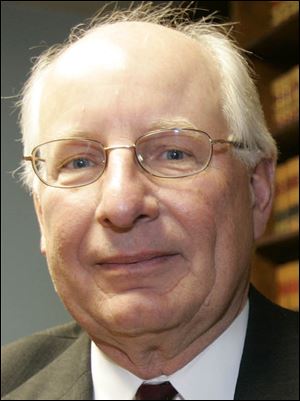
Ohio justice urges repeal of death penalty
12/15/2011
Ohio State Supreme Court Justice Paul Pfeifer
COLUMBUS -- Ohio Supreme Court Justice Paul Pfeifer said Wednesday he believes it's only a matter of time before the death-penalty law he helped write 30 years ago will end.
He urged the House Criminal Justice Committee to make that date sooner rather than later.
"The death penalty in Ohio has become what I call a death lottery,'' the most senior member of the high court said. He cited the location of the murder and the attitudes of individual county prosecutors as variables affecting whether the death penalty is pursued.
He noted that only "four or five'' of roughly 100 capital indictments filed in Ohio each year reach conviction and a death sentence. Most end up in plea bargains.
"It's very difficult to conclude that the death penalty, as it exists today, is anything but a bad gamble,'' he said. "That's really not how a criminal justice system should work.''
He said he doesn't believe the existence of the death penalty in Ohio serves as a deterrent to murder.
"If ever there was a time when the law could have been a deterrent it was when we had the electric chair,'' Justice Pfeifer said.
Ohio lawmakers, however, took the electric chair off the table as an execution option in 2003 in favor of the lethal injection gurney. "If we're going to have the death penalty, we ought to have it unpleasant for everybody,'' Justice Pfeifer said.
The justice's beliefs on the application of the law that he helped to write as a state senator are well-known, but this is the first time he has testified before lawmakers on the subject. As a sitting justice, he has continued to vote to uphold death sentences and to set execution dates under the law.
Twelve executions have been scheduled, and Justice Pfeifer said two more are coming up, carrying the process into 2014. "I have a duty under the law to follow that law,'' the Republican justice said outside the hearing room. "At the same time, we are admonished under the rules that apply to judges that we have a duty to step forward and advocate for changes we think would lead to an improvement in the law.
"Abolishing the death penalty would be a needed improvement,'' he said. "It will happen. Will it be today, tomorrow, or in this session of the General Assembly? More problematic. But the day will come when Ohio no longer has a death penalty.''
Justice Pfeifer is not the first Supreme Court justice to testify before legislators. The late Chief Justice Thomas Moyer testified on judicial reform and mayors' courts and Justice Evelyn Lundberg Stratton testified on sentencing reform.
Current Chief Justice Maureen O'Connor has convened a yearlong task force to examine the fairness of how Ohio's death penalty law is applied, but she has stressed the task force will not second-guess whether Ohio should have the death penalty.
There are 147 men and one woman on Ohio's death row.
Wednesday's hearing, the second so far on House Bill 160, included testimony only from the American Civil Liberties Union, religious leaders, defense attorneys, former death-row inmates, and others supporting the bill. Prosecutors have generally opposed attempts to weaken Ohio's death-penalty law.
"I think there's been on at least one occasion in a capital case where an affidavit alleging prejudice was filed against Justice Pfeifer because of the opinions he has expressed …,'' Lucas County Prosecutor Julia Bates said when contacted after the hearing.
"I'm not sure that is appropriate for somebody who is sitting in judgment and deciding capital cases,'' she said. "These cases go directly to the Supreme Court, bypassing the courts of appeals.
"It's the worst of the offenders for the worst form of crime, at least in my county,'' Ms. Bates said. "Sometimes the death penalty is returned [by juries], and sometimes it isn't. Every case is different. I don't think it has to do with how good the prosecutor is or how bad the defense attorney is. It has to do with bad acts and how bad the defendant is, whether the aggravating circumstances outweigh any possible mitigating factors. Maybe there is no mitigation.''
Among those testifying Wednesday was Dale Johnston, who spent seven years on death row for the 1982 murder of his daughter, Annette, and her boyfriend in a Hocking County cornfield. The Ohio Supreme Court later overturned his conviction, and another man is now serving a life sentence for the crimes.
"Before Annette's brutal murder and my wrongful conviction, I was a supporter of the death penalty,'' Mr. Johnston said. "I thought it was a punishment that our state should have. I never imagined that I or another innocent man could be on death row, but it happened to me. If it happened to me, it could happen to anyone.''
Contact Jim Provance at: jprovance@theblade.com or 614-221-0496.